Record of the Press Conference of the White Paper "China’s National Defense in the New Era" by Information Office
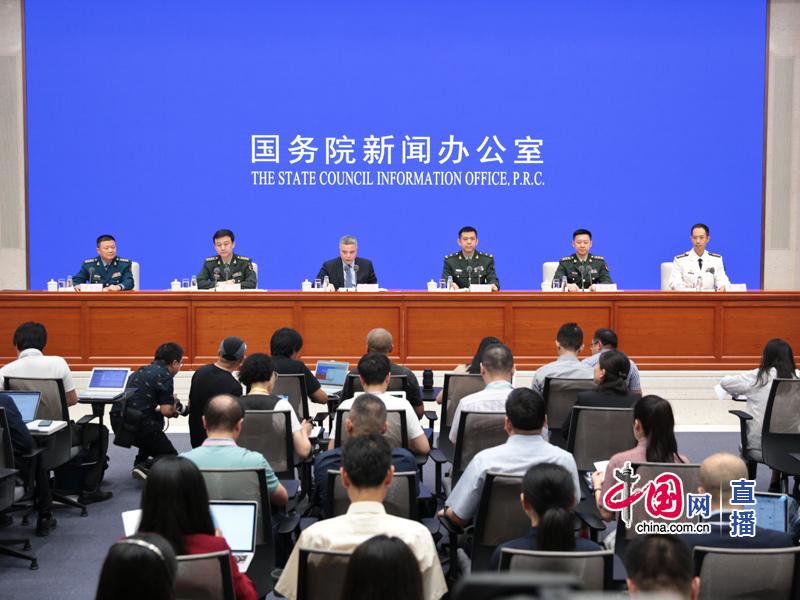
The press conference of the State Council Office. China Net Sun Yushe
On Wednesday, July 24, 2019, the State Council Press Office published a white paper entitled "China’s National Defense in the New Era" and held a press conference in the press room of the State Council Press Office at 10 am that day. Hu Kaihong, spokesperson of the State Council Press Office, Senior Colonel Wu Qian, spokesperson of the Ministry of National Defense, Major General Cai Zhijun, deputy director of the Operations Bureau of the Joint Staff of the Central Military Commission, Colonel Pan Qinghua, deputy director of the Propaganda Bureau of the Political Work Department of the Central Military Commission, Senior Colonel Wang Taiguo, deputy director of the Finance Bureau of the Logistics Support Department of the Central Military Commission, and Senior Colonel Wang Weijun, deputy director of the Coordination and Supervision Bureau of the Reform and Establishment Office of the Central Military Commission, were invited to attend, introduce and interpret the white paper and answer questions from reporters.
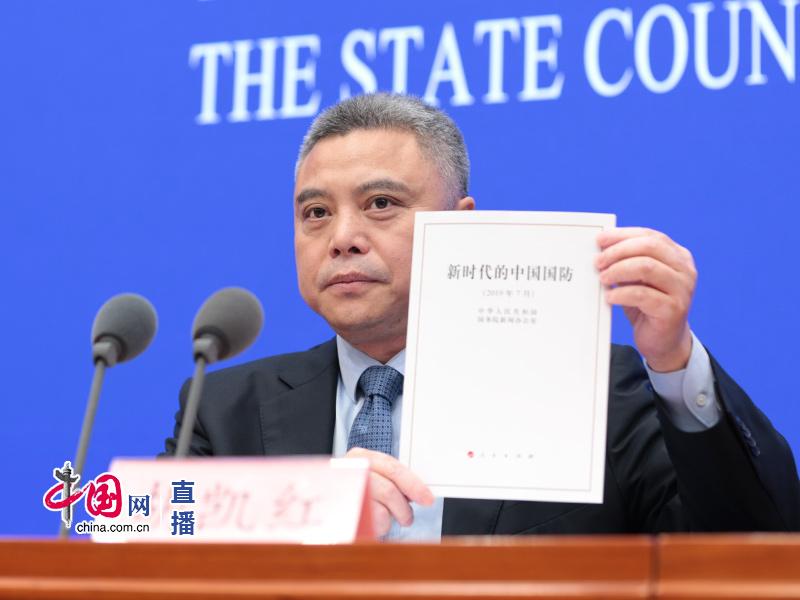
The State Council Press Office published a white paper entitled "China’s national defense in the new era". China Net Sun Yushe
Hu Kaihong, spokesperson of the State Council Press Office:
Good morning, ladies and gentlemen. Welcome to the press conference held by the State Council Information Office today. Today, the Press Office of the State Council, China published a white paper entitled "China’s National Defense in the New Era" and held a press conference to introduce and interpret the main contents of the white paper. Present at today’s press conference are: Senior Colonel Wu Qian, spokesman of the Ministry of National Defense; Major General Cai Zhijun, Operations Bureau of the Joint Staff of the Central Military Commission; Colonel Pan Qinghua, Political Work Department of the Central Military Commission; Senior Colonel Wang Taiguo, Logistics Support Department of the Central Military Commission; and Senior Colonel Wang Wei, Reform and Establishment Office of the Central Military Commission. I am Hu Kaihong, spokesperson of the State Council Press Office, and I will preside over today’s press conference.
First of all, I will make an introduction to the contents of the white paper.
The White Paper "China’s National Defense in the New Era" is the first comprehensive national defense white paper published by China since the 18th National Congress of the Communist Party of China. Focusing on the concern of the international community for the development of China’s army, the White Paper comprehensively and systematically introduces the characteristics, important principles and basic connotations of China’s defensive national defense policy in the new era, and clarifies the mission and tasks of the "four strategic supports" of China’s army in the new era for the first time. Fully expound the distinctive features of China’s national defense in the new era, which is "never seeking hegemony, never expanding and never seeking sphere of influence", fully expound the reasonable and moderate defense expenditure of China, fully expound the world significance of the development of China’s army in the new era and the positive contribution made by China’s army to promoting the construction of a community of human destiny. The full text of the white paper is about 27,000 words, which consists of four parts: preface, text, conclusion and appendix.
The white paper points out that today’s world is experiencing a great change that has never happened in a century. The world’s multi-polarization, economic globalization, social informationization and cultural diversity are developing in depth. The trend of the times of "peace, development, cooperation and win-win" is irreversible, but the instability and uncertainty faced by international security are more prominent. The international strategic pattern has profoundly evolved, the security situation in the Asia-Pacific region is generally stable, the risks and challenges facing China’s national security cannot be ignored, the international military competition is becoming increasingly fierce, and the world is not peaceful.
The white paper points out that China will unswervingly pursue a defensive national defense policy. The fundamental goal of China’s national defense in the new era is to resolutely defend national sovereignty and security and develop interests. Its distinctive feature is that it will never seek hegemony, expansion and sphere of influence. Its strategic guidance is to implement the military strategic policy of the new era. Its development path is to stick to the road of strengthening the army with China characteristics, and its world significance is to serve and build a community of human destiny.
The white paper points out that in the new era, China’s army has resolutely fulfilled the mission entrusted by the Party and the people in accordance with the strategic requirements of national security and development, and provided strategic support for consolidating the Communist Party of China (CPC)’s leadership and socialist system, defending national sovereignty and unifying territorial integrity, safeguarding national overseas interests and promoting world peace and development.
The white paper points out that in the new era, China has comprehensively promoted the modernization of national defense and the armed forces, comprehensively deepened the reform of national defense and the armed forces, reshaped the leadership and command system, optimized the scale structure and strength, promoted the reform of the military policy system, adjusted and reformed the arms and services and the armed police force, promoted the all-round construction of national defense and the armed forces, and made historic steps to strengthen the army and revitalize it.
The white paper points out that China’s armed forces faithfully practice the concept of a community of human destiny, firmly uphold the purposes and principles of the UN Charter, promote the construction of a new security partnership featuring equality, mutual trust and win-win cooperation, promote the construction of a regional security cooperation framework, properly handle territorial issues and maritime delimitation disputes, actively provide international public security products, and strive to contribute to the construction of a beautiful world with lasting peace and universal security.
白皮书强调,新时代的中国国防,在习近平强军思想指引下,将沿着中国特色强军之路,向着全面建成世界一流军队的宏伟目标奋勇前进。中国军队有决心有信心有能力战胜一切威胁挑战,为实现中华民族伟大复兴的中国梦提供坚强战略支撑,为服务构建人类命运共同体做出新的更大贡献。
《新时代的中国国防》白皮书以中、英、法、俄、德、西、阿、日等8个语种发表,由人民出版社、外文出版社分别出版,在全国新华书店发行。
我就先介绍这些情况。下面,请国防部新闻发言人吴谦大校作介绍。
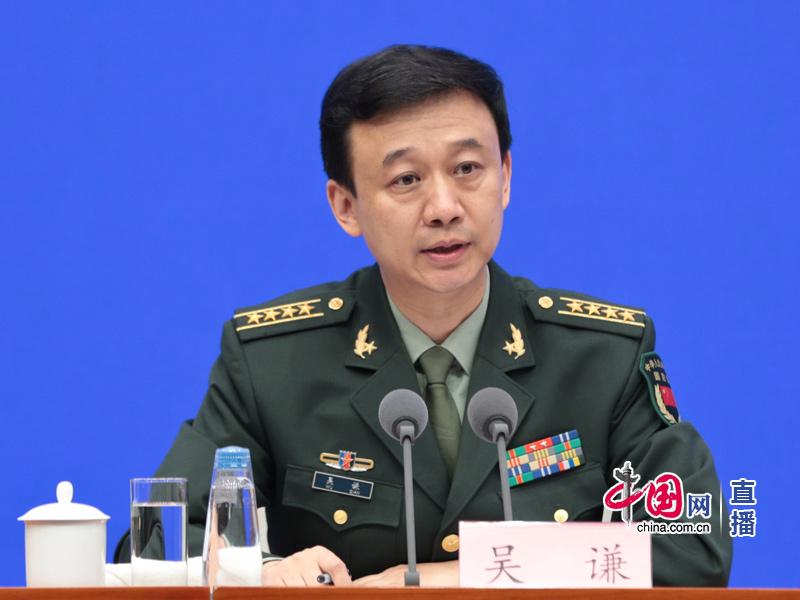
国防部新闻发言人吴谦大校回答提问。中国网 孙宇 摄
国防部新闻发言人 吴谦:
女士们、先生们、朋友们,大家上午好。今天《新时代的中国国防》白皮书正式与大家见面,这是中国政府自1998年以来发表的第10部国防白皮书,也是党的十八大以来发表的首部综合型国防白皮书。发表国防白皮书的目的是为了阐释新时代中国防御性国防政策,向国际社会更好地介绍中国建设巩固国防和强大军队的实践、目的、意义,增进国际社会对中国国防的理解,增进中国与世界各国的互信与合作。
The white paper "China’s National Defense in the New Era" is divided into four parts: preface, text, conclusion and appendix, with a total of about 27,000 words. The text includes six chapters: the international security situation, China’s defensive national defense policy in the new era, fulfilling the mission of the army in the new era, China’s national defense and army in reform, reasonable and moderate national defense expenditure, and active service to build a community of human destiny. The appendix includes ten tables, which mainly introduce the basic situation of the organs and departments of the Central Military Commission, the scale structure of China’s defense expenditure, the major joint training activities of the PLA and the Armed Police Force since 2012, and the major United Nations peacekeeping operations that the China Army participated in.
The main contents of the white paper "China’s National Defense in the New Era" include six aspects:
First, objectively analyze the current international security situation and China’s security environment. The white paper points out that today’s world is experiencing a great change that has never happened in a century. The instability and uncertainty facing the world are more prominent, international strategic competition is on the rise, global and regional security issues are increasing, international military competition is becoming increasingly fierce, and the world is not peaceful. However, it must be noted that promoting peace, stability and development have become the universal demands of the international community. The rise of peace forces far exceeds the growth of war factors, and the trend of the times of peace, development, cooperation and win-win is irreversible. At the same time, the white paper points out that China’s national security situation is generally stable, but it faces multiple and complex security threats and challenges, especially the anti-secession struggle.
Second, systematically expound China’s defensive national defense policy in the new era. The white paper emphasizes that resolutely defending the interests of national sovereignty, security and development is the fundamental goal of China’s national defense in the new era. Insisting on never seeking hegemony, never expanding and never seeking the sphere of influence is the distinctive feature of China’s national defense in the new era, and implementing the military strategic policy in the new era is the strategic guidance of China’s national defense in the new era. Adhering to the road of strengthening the army with China characteristics is the development path of China’s national defense in the new era. Serving and building a community of human destiny is the world significance of China’s national defense in the new era.
Third, comprehensively introduce China’s army’s mission in the new era. The white paper makes it clear that the mission of China’s army in the new era is "four strategic supports", and introduces the application of Chinese armed forces from seven aspects: safeguarding national territorial sovereignty and maritime rights and interests, maintaining a constant state of readiness, carrying out actual combat military training, safeguarding major security interests, carrying out anti-terrorism and maintaining stability, safeguarding overseas interests, and participating in emergency rescue and disaster relief.
Fourth, introduce the historical achievements in deepening the reform of national defense and the army in a panoramic way. The white paper systematically introduces China’s army’s efforts to reshape its leadership and command system, optimize its scale structure and strength, and promote the reform of its military policy system. This paper comprehensively introduces the basic situation of the services and armed police forces after the adjustment and reform, as well as the overall construction of national defense and the army in terms of ideology and politics, military theory, weapons and equipment, logistics support, etc., and shows the brand-new image of China’s army after the reform.
Fifth, introduce China’s defense expenditure in many dimensions. The white paper combs the development course of China’s defense expenditure since the reform and opening up, comprehensively introduces the scale structure and basic use of China’s defense expenditure since 2012, and reflects the openness and transparency of China’s defense expenditure. In addition, the white paper also makes an international comparison of defense expenditure, which shows that China’s defense expenditure is reasonable and moderate.
Sixth, introduce in depth the positive efforts and great contributions made by China’s army in maintaining world peace and stability and serving to build a community of human destiny. The white paper points out that building a community of human destiny conforms to the trend of peaceful development and reflects the common expectations of people of all countries. The white paper gives a detailed introduction from five aspects: safeguarding the purposes and principles of the UN Charter, promoting the construction of a new security partnership, promoting the construction of a regional security cooperation framework, properly handling territorial issues and maritime delimitation disputes, and actively providing international public safety products.
The new version of the white paper has been innovated and developed on the basis of inheriting the tradition. Compared with the past, it mainly has the following characteristics:
First, the defensive national defense policy system of China in the new era is constructed for the first time. The white paper states that China’s nature as a socialist country, its strategic choice of taking the road of peaceful development, its independent foreign policy of peace and the Chinese cultural tradition of "harmony is the most important thing" determine that China will unswervingly pursue a defensive national defense policy. The white paper reveals the strategic, stable and systematic nature of China’s defensive national defense policy by enriching and perfecting the new era connotation of national defense policy.
Second, the mission and task of China army in the new era are expounded for the first time. The white paper clearly states that the mission of China Army in the new era is "four strategic supports", namely: to provide strategic support for consolidating the Communist Party of China (CPC)’s leadership and socialist system; Provide strategic support for safeguarding national sovereignty, unity and territorial integrity; Provide strategic support for safeguarding the country’s overseas interests; Provide strategic support for promoting world peace and development. The white paper expounds the defensive, just and limited nature of the construction and application of the armed forces by introducing the concrete practice of China’s army in fulfilling its mission in the new era.
Thirdly, it is pointed out for the first time that "never seek hegemony, never expand and never seek spheres of influence" is a distinctive feature of China’s national defense in the new era. The White Paper reaffirms the essential nature of China’s national defense and self-defense, emphasizes China’s national defense construction and development, and always focuses on meeting the legitimate needs of its own security, which is always the growth of world peace forces. Through the policy declaration, the white paper profoundly reveals that China will never pursue hegemony and "a strong country will dominate". No matter where it develops in the future, China will never threaten anyone or seek to establish a sphere of influence.
第四,首次提出服务构建人类命运共同体是新时代中国国防的世界意义。白皮书深刻揭示中国梦与世界梦、中国国防和军队建设同世界和平稳定的内在必然联系。强调中国军队的发展壮大,不仅为中国梦提供战略支撑,同时也是世界和平稳定的强大正能量。
第五,首次全景式展现深化国防和军队改革取得的历史性成就。白皮书系统呈现中国军队进入新时代以来,深入贯彻习近平强军思想,坚持走中国特色强军之路,全面深化国防和军队改革的情况。通过公布改革的时间表、路线图、成绩单,深刻揭示中国军队迈出构建中国特色军事力量体系的历史性步伐,展现人民军队新的体制、结构、格局和面貌。
第六,首次将国防费位居世界前列的国家进行国际比较。白皮书从国防费占国内生产总值比重,国防费占财政支出比重和人均国防费水平等三个维度,比较2017年国防费位居世界前列国家的有关情况,有力说明中国国防费增长是合理适度的,开支水平是偏低的。白皮书强调,中国国防开支与维护国家主权、安全、发展利益的保障需求相比,与履行大国责任义务的保障需求相比,与自身建设发展的保障需求相比还有较大差距,将继续保持适度稳定增长。
以上是我的介绍,下面我和我的同事愿意回答各位记者朋友的提问。
Hu Kaihong:
下面开始提问,提问之前请通报所代表的新闻机构。
中央广播电视总台央视记者:
我们注意到,新版国防白皮书的题目是《新时代的中国国防》,这与以往的综合型国防白皮书不同,请问这样命名的考虑是什么?另外,我们也注意到当前的国际形势正在发生复杂深刻的变化。请问,新版国防白皮书是如何评价当前国际国内安全形势的?谢谢。
Wu Qian:
我来回答你这个问题。党的十九大鲜明指出,中国特色社会主义进入了新时代,中国国防和军队建设正站在新的历史起点上。新时代的中国国防,深入贯彻习近平强军思想,深入贯彻习近平军事战略思想,坚持以党在新时代的强军目标为引领,贯彻新时代军事战略方针,坚持走中国特色强军之路,国防和军队建设取得历史性成就、发生历史性变革。人民军队体制一新、结构一新、格局一新、面貌一新。新时代首部综合型国防白皮书顺应时代发展,把握世情国情军情,全面系统介绍国防和军队建设新的政策遵循,新的使命任务、新的战略安排和新的强军实践,有利于国际社会和国内民众更加全面客观地了解新时代的中国国防和军队建设。
关于你的第二个问题,当前国际战略格局深刻演变,国际力量加快分化组合,新兴市场国家和发展中国家力量持续上升,战略力量对比此消彼长,更趋均衡,促和平、求稳定、谋发展已经成为国际社会的普遍诉求,和平力量的上升远远超过战争因素的增长。但是,霸权主义、强权政治、单边主义时有抬头,地区冲突和局部战争持续不断,国际安全体系和秩序受到冲击。这部白皮书对当前的国际国内安全形势作出四个战略判断:一是国际战略格局深刻演变,二是亚太安全形势总体稳定,三是中国的国家安全面临的风险挑战不容忽视,四是国际军事竞争日趋激烈。
在纷繁复杂的国际国内形势面前,中国坚信和平、发展、合作、共赢的时代潮流不可逆转,称霸扩张终将失败,安全繁荣应该共享。我们呼吁,各国应超越文明冲突、冷战思维、零和博弈,坚持对话协商、求同存异、共建共享,携手应对全球性挑战,共同走和平发展道路,推动构建人类命运共同体,努力建设一个持久和平、普遍安全、共同繁荣、开放包容、清洁美丽的世界,让人类生活更加幸福美好。谢谢。
中国日报记者:
新版国防白皮书提出了习近平军事战略思想,请问这一重大思想形成的时代背景和重大意义是什么?有哪些理论特质和历史贡献?
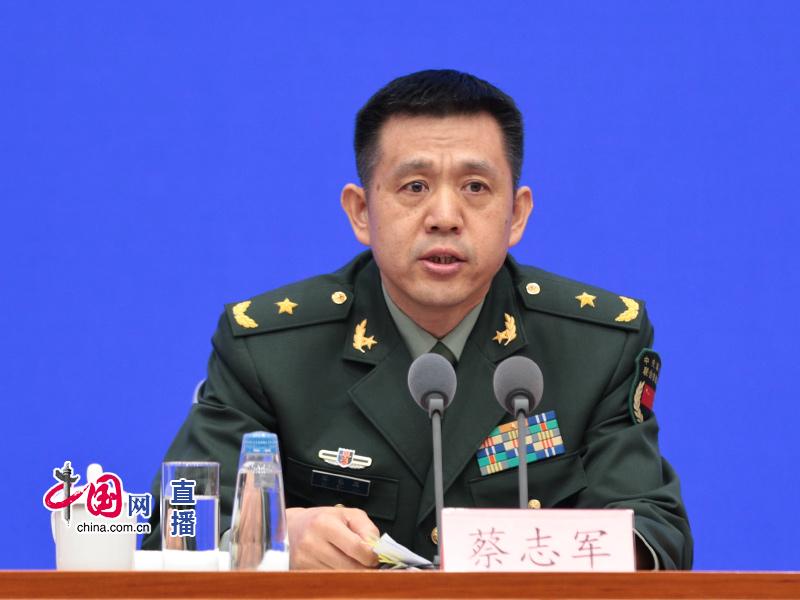
中央军委联合参谋部作战局副局长蔡志军少将回答提问。中国网 孙宇 摄
中央军委联合参谋部作战局副局长 蔡志军:
谢谢这位记者朋友的提问。军事战略思想是一支军队的旗帜引领,是随着时代的发展而发展的。党的十八大以来,习主席在领导国防和军队建设、指挥现实军事斗争的伟大实践中,着眼顺应世界百年未有之大变局、应对国家安全面临的各种风险挑战、全面建成世界一流军队的战略需要,鲜明提出一系列新思想新观点新论断新要求,与时俱进、创新发展军事战略指导,形成了习近平军事战略思想。习主席作为党的核心、军队统帅,是这一重大思想的主要创立者,对形成习近平军事战略思想起到了决定性作用。
习近平军事战略思想始终坚持积极防御战略思想这个基本点,深刻揭示新时代战争与和平、军事与政治、总体安全与军事安全等重大关系,全面系统地回答了新时代军事战略指导的一系列根本性、全局性、方向性重大问题。这一重大思想是马克思主义战争观、方法论在新时代中国国防和军队建设中的创新和发展,是习近平新时代中国特色社会主义思想在军事战略领域的运用和展开,是习近平强军思想的重要组成部分,是科学的思想体系和理论体系。
习近平军事战略思想,具有鲜明的科学品质。一是理论特质,继承和发展党的军事指导理论精要,是马克思主义战争观方法论中国化的最新成果。二是时代特色,把握中国特色社会主义进入新时代、国防和军队建设也进入新时代的历史方位,与时俱进发展军事战略指导。三是战略特色,科学把握战争规律和战争的指导规律,赋予积极防御战略思想新的内涵。四是实践特色,根植于强军兴军的伟大实践,持续彰显真理光芒和实践伟力,具有独特的战略风格、战略魅力、战略气派。
习近平军事战略思想,开辟了马克思主义战争观安全观的新境界,开辟了支撑中华民族伟大复兴战略布局的新境界,开辟了维护国家安全战略运筹的新境界,开辟了国防和军队现代化战略设计的新境界,是当前和今后一个时期我军军事力量运用和建设的根本遵循和科学指南。2019年的1月在北京召开的中央军委军事工作会议,确立习近平军事战略思想为新时代军事战略根本指导思想,这是维护核心的政治要求,是强军兴军的必然选择,是谋战胜战的客观需要,也是全军上下的共同期盼。谢谢。
American cable news reporter:
We have seen that the US military has made a statement to the South Korean side on the incident that Chinese and Russian military aircraft "invaded" South Korea’s airspace, saying that the US military has closely coordinated with South Korea and Japan’s allies on this matter and will also communicate with the Chinese and Russian armed forces through diplomatic channels. I don’t know what kind of confirmation and response the China military can make on this matter. There is also a related issue. The new US Defense Secretary Esper was inaugurated in Washington yesterday. Esper is recognized as a hardliner against China in the United States. Earlier this year, he said that the strategic competitive relationship between the Chinese and American armed forces is the basis of his entire cognitive system, and also indicated that the Chinese and Russian armed forces have vigorously developed their military capabilities and weapons and equipment in recent years, which is a long-term threat to the United States. Many people think that the US military will be more willing to openly confront China’s army after he becomes defense chief. What’s your response? Are you worried about the relationship between the Chinese and American armed forces after Esper became the defense chief? Thank you.
Wu Qian:
Let me answer your first question first. On July 23rd, the air forces of China and Russia organized the first joint air strategic cruise in Northeast Asia. China sent two H -6K aircraft to form a mixed formation with two Tu -95 aircraft from Russia, and organized a joint cruise in the relevant airspace of the Sea of Japan and the East China Sea according to the established route. During the flight, the aircraft of the air forces of the two countries strictly observed the relevant provisions of international law and did not enter the airspace of other countries.
The purpose of this joint cruise is to deepen and develop the comprehensive strategic partnership of cooperation between China and Russia in the new era, further enhance the strategic cooperation level and joint action capability of the Chinese and Russian armed forces, and jointly safeguard global strategic stability. This action is a project in the annual cooperation plan between the Chinese and Russian armed forces and is not aimed at third parties.
At the same time, we have also noticed that the Russian Ministry of Defense has issued a statement on this, and I suggest you read it.
On the second question, we are also concerned about the appointment of Defense Minister Esper as the US Secretary of Defense. We congratulate him on this and hope that the relations between the Chinese and American armed forces will develop healthily and steadily during the tenure of Defense Minister Esper. However, I would like to emphasize two points here: First, China’s sovereignty, security and development interests are inviolable. Second, the development of China’s military power is entirely the development of world peace forces. Thank you.
解放军报记者:
我们注意到新版的白皮书介绍了深化国防和军队改革的举措和取得的成就。请问这次改革顺利推进的原因和主要做法是什么?去年11月,中央军委召开政策制度改革工作会议,全面部署军事政策制度改革任务,新版国防白皮书也对此作了相应介绍。能否介绍一下军事政策制度改革的主要特点和相关的进展情况。
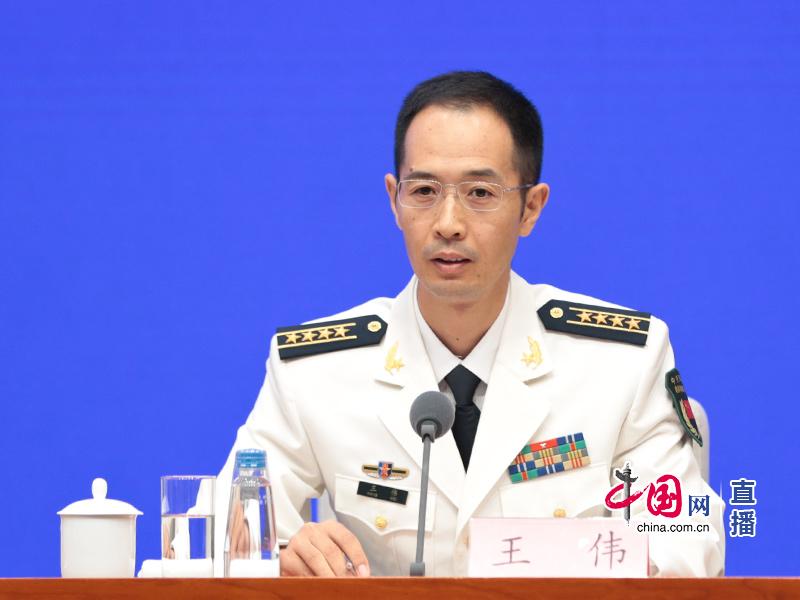
中央军委改革和编制办公室协调督查局副局长王伟海军大校回答提问。中国网 孙宇 摄
中央军委改革和编制办公室协调督查局副局长 王伟:
谢谢你的问题。首先回答第一个问题,习主席亲自领导、亲自决策、亲自推动是深化国防军队改革的根本保证。党的十八大以来,习主席亲自决策,把国防和军队改革纳入全面深化改革的总盘子,成立中央军委深化国防和军队改革领导小组并担任组长,亲自领导改革调研论证和方案拟制工作,亲自组织研究改革重大问题,亲自出席一系列军队改革工作会议,亲自向新调整组建大单位授旗并发布训词训令,紧跟改革进程发表一系列的重要讲话。深化国防和军队改革能够攻坚克难、连战连捷、成果巨大,根本在于党中央、中央军委和习主席的坚强领导,在于习近平强军思想的科学指引。
这次深化国防和军队改革,坚持体系化设计、工程化推进,总体上是按照“三大战役”来打的。第一仗,率先展开领导指挥体制改革,重在解决体制性障碍;第二仗,压茬推进规模结构和力量编成改革,重在解决结构性矛盾;第三仗,着力深化政策制度改革,重在解决政策性问题。全军官兵坚决贯彻落实党中央、中央军委和习主席改革决策部署,各级党委和政府、人民群众对国防和军队改革大力支持,汇集起改革强军的磅礴力量。这次改革,打破了长期实行的总部体制、大军区体制、大陆军体制,形成了军委管总、战区主战、军种主建的新格局,改变了长期以来陆战型、国土防御型的力量结构和兵力布势。
The second question is about policy system reform. This military policy system reform is an important content and an important guarantee for deepening the reform of national defense and the army. It involves all fields, aspects and links of military practice and is systematic, holistic and coordinated. The most striking feature of this military policy system reform is to profoundly grasp the characteristics and internal mechanism of policy system construction and do a good job in top-level planning and system design. Adhere to the military policy system reform in the overall situation of strengthening the country and the military, and promote it in the process of building a world-class army, remould the whole from the four links of command, construction, management and supervision, clearly put forward the establishment and improvement of Socialism with Chinese characteristics’s military policy system, and put forward the layout of the military party building system, military force application policy system, military force building policy system and military management policy system. This "one big system, four big plates" has clear orientation, comprehensive coverage, tight structure and internal coordination, which conforms to China’s national conditions and military situation and adapts to the requirements of the new era, new mission and new system.
The main arrangement of this policy system reform is to complete the main policy system reform in all fields of various systems and build the basic framework of Socialism with Chinese characteristics’s military policy system before 2020. By 2022, we will improve the supporting policy system in various fields and build a relatively complete military policy system in Socialism with Chinese characteristics. After last year’s work conference on policy system reform of the Central Military Commission, all departments and major units of the Central Military Commission combined with their respective tasks to formulate road maps and construction drawings in different fields. At present, the reform of military policy system is progressing in an orderly manner as planned. At the same time, focusing on the urgent need for reform, preparation for war and officers’ eagerness, we have jointly promulgated a series of policy systems, such as strengthening the construction of military party organizations, improving the treatment guarantee for officers and men, commanding officers in joint operations, military training supervision, and civilian employment management. There are 27 policy systems in this regard, all of which have been completed in the first half of this year, and relevant information has also been disclosed in the media. If you want to have a comprehensive understanding, you can look them up.
The promulgation of these policies and systems has played an important role in deepening the effectiveness of reform, concentrating on training and preparing for war, and responding to the concerns of officers and men, and has been highly praised by the army.
China International Television (CGTN) reporter from Central Radio and Television General Station:
We have noticed that this white paper mentions that an important strategic task of China’s army is to protect overseas interests, which will mean that China’s army will participate more in overseas military operations. May I ask the spokesman, is this kind of action inconsistent with the peaceful development path of China’s army emphasized in the white paper? Thank you.
Wu Qian:
Let me answer this question. The short answer is that there is no contradiction between the two. On the one hand, China’s army goes to the world in order to effectively safeguard the country’s overseas interests and better fulfill its military mission in the new era. On the other hand, it is to meet the general expectations of the international community and provide more public safety products. In the white paper, you can find many such examples, whether it is peacekeeping, escort or humanitarian relief and disaster reduction. China’s nature as a socialist country, its strategic choice to take the road of peaceful development, its independent foreign policy of peace and the Chinese cultural tradition of "harmony is the most important thing" determine that China will always pursue a defensive national defense policy, and never seek hegemony, expansion and sphere of influence are the distinctive features of China’s national defense in the new era. In other words, China’s army’s going to the world has brought security rather than threats, opportunities rather than challenges to the world. Thank you.
Phoenix TV reporter:
We saw this white paper, which was the first comprehensive white paper after the 18th National Congress of the Communist Party of China. Compared with the previous white paper, it is found that there have been great changes in the judgment of the security situation, especially in the part of national security risks. It is very clear that "the situation of the anti-secession struggle is more severe", which was only a point in the past, without clearly listing the specific security threats, and the term "more severe" is different from the past. Excuse me, how is this change considered? Thank you.
Wu Qian:
白皮书讲到反分裂斗争的形势更加严峻,依据只有一个,那就是事实。因为大家可以看到,民进党自上台以来顽固坚持“台独”分裂立场,拒不承认“九二共识”,对内推行渐进“台独”,对外企图挟洋自重,在分裂道路上越走越远,这是有目共睹的事实。通过白皮书我们想传达的信号是非常清晰明确的:搞“台独”就是死路一条,中国一点也不能少。我们愿意尽最大的努力,争取和平统一的前景,但是我们决不允许任何人、任何组织、任何政党、在任何时候、以任何形式、把任何一块中国领土从中国分裂出去。
中央广播电视总台国广记者:
我们知道,习近平主席非常重视从思想上政治上建设军队,明确提出政治建军是我军的根本性建设,能否介绍一下党的十八大以来军队思想政治建设情况。
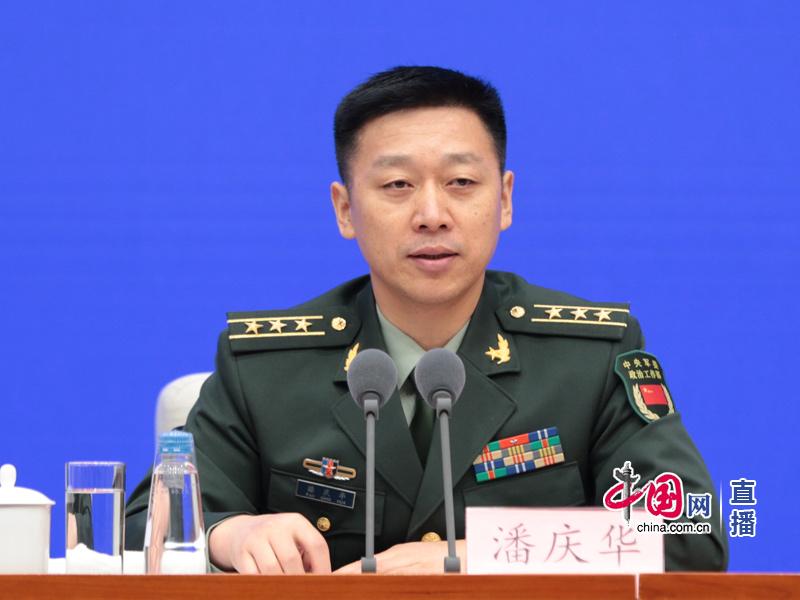
中央军委政治工作部宣传局潘庆华上校回答提问。中国网 孙宇 摄
中央军委政治工作部宣传局 潘庆华:
谢谢你的问题。政治工作是我军的生命线,也是我军的最大特色和最大优势。党的十八大以来,军队政治工作紧紧围绕实现中华民族伟大复兴的中国梦,紧紧围绕实现党在新时代的强军目标、把人民军队全面建成世界一流军队,大力改进加强和创新发展,充分发挥了对强军兴军的生命线作用。最根本、最重要的是牢固确立习近平强军思想的指导地位,坚决维护习近平总书记党中央的核心、全党的核心地位,坚决维护党中央权威和集中统一领导,贯彻中央军委主席负责制,全军政治意识、大局意识、核心意识、看齐意识进一步增强。集中体现在三个方面:一是紧盯军队过去存在的一些突出问题,印发《关于新形势下军队政治工作若干问题的决定》,坚定不移推进政治整训,重整政治纲纪,把理想信念、党性原则、战略标准、政治工作威信等根本性的东西牢固立起来。二是召开中央军委党的建设会议,着力抓好党的政治建设,严肃党的政治生活,锻造坚强有力的党组织,全面加强新时代军队党的领导和党的建设工作。三是适应强军目标要求,把握新形势下筑魂育人的特点规律,着力培养有灵魂、有本事、有血性、有品德的新时代革命军人,锻造具有铁一般信仰、铁一般信念、铁一般纪律、铁一般担当的过硬部队。
Global Times reporter:
According to foreign media reports, Qian Weiping, former vice minister of the Equipment Development Department of the Central Military Commission, was arrested for espionage. Can the Ministry of National Defense confirm and comment?
Wu Qian:
I can tell you clearly that Qian Weiping’s involvement in espionage is not true. It is understood that Qian Weiping was investigated by the Supervision Committee of the Commission for Discipline Inspection of the Central Military Commission on suspicion of serious violation of discipline and duty crimes.
Hong Kong Wen Wei Po reporter:
I noticed that the fifth chapter of the white paper talked about national defense expenditure. At the end of page 42, it was mentioned that China’s national defense expenditure is far from the needs of safeguarding national sovereignty, security and development interests, and the needs of fulfilling the international responsibilities of big countries, and the needs of its own construction and development. How do you understand this sentence? Thank you.
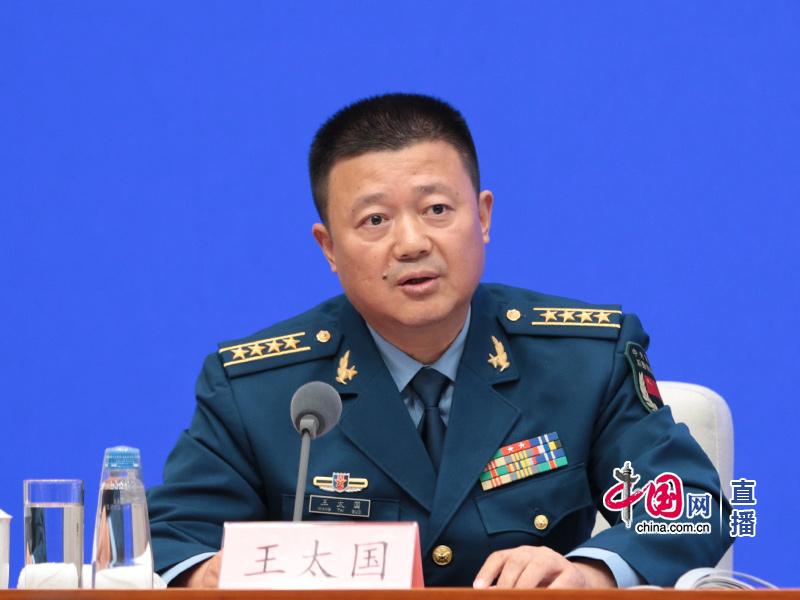
Wang Taiguo, Deputy Director of Finance Bureau of Logistics Support Department of Central Military Commission, answered questions. China Net Sun Yushe
Wang Taiguo, Deputy Director of Finance Bureau of Logistics Support Department of Central Military Commission:
In the new era, China’s army has resolutely fulfilled the mission entrusted by the Party and the people according to the strategic needs of national security and development, and provided strategic support for consolidating the Communist Party of China (CPC)’s leadership and socialist system, defending national sovereignty, unity and territorial integrity, safeguarding national overseas interests and promoting world peace and development.
However, China is the only big country in the world that has not yet achieved complete reunification, and it is one of the countries with the most complicated security situation around the world. China’s army is facing severe challenges in safeguarding national sovereignty, territorial integrity and maritime rights and interests.
At present, global problems and challenges continue to increase. With the development of the armed forces of China and China, the international community’s expectations for China’s military to provide international public safety products are increasing. China’s army has actively fulfilled its international responsibilities and participated extensively in peacekeeping, escort and disaster relief, and will invest more and more in this field in the future.
At the same time, China’s army is in the stage of information transformation, and the task of adapting to the development trend of the new military revolution in the world and promoting military transformation with China characteristics is arduous and arduous, so it can be said that there is still a long way to go.
Because of this, there is still a big gap between China’s national defense expenditure and the demand for safeguarding national sovereignty, security and development interests, and the demand for fulfilling the international responsibilities and obligations of big countries, and the demand for its own construction and development. China’s defense expenditure will be coordinated with the national economic development level and will continue to maintain moderate and steady growth.
Taiwan Province China Times reporter:
Page 15 of the white paper mentions organizing warships to cruise around the island. We know that there are still six months before the 2020 general election in Taiwan Province next year. Will the PLA increase the frequency of warships cruising around the island? There is public opinion in Taiwan Province that the greater the PLA’s action, the more it means that the mainland is suppressing and threatening Taiwan Province, which is tantamount to helping Democratic Progressive Party’s candidates in their election and boosting their election situation. I wonder what the mainland will think? In addition, a few days ago, during Tsai Ing-Wen’s visit, the Ministry of National Defense of the mainland released a message saying that the People’s Liberation Army held a routine military exercise on the southeast coast. The Global Times also quoted people familiar with the matter as saying that five services were mobilized to participate in joint exercises, which formed a shock to Taiwan. Please tell me about the exercise.
Wu Qian:
Indeed, as you said, Taiwan Province is mentioned in many places in the White Paper, which shows that the Taiwan Province issue concerns China’s core interests and is extremely important. We believe that blood is thicker than water, and we are willing to strive for the prospect of peaceful reunification with the greatest sincerity and best efforts. But we must firmly point out that "Taiwan independence" is a dead end. If anyone dares to try to split Taiwan Province from China, China’s army will resolutely defend the country’s sovereignty, unity and territorial integrity at all costs.
Regarding the second question about the exercises in the southeast coast, the Ministry of National Defense has released information on this issue, and I have nothing to add here.
China News Service reporter:
It is mentioned in the white paper that the strategic guidance of China’s national defense in the new era is to implement the military strategic policy in the new era. Is there any further content of the military strategic policy in this new era that can be disclosed and introduced? Thank you.
Cai Zhijun:
Thank you for your question. Since the founding of the People’s Republic of China, our army has inherited the strategic thought and tradition of active defense, and has made eight major adjustments to the military strategic policy, once every eight to ten years on average. Each major adjustment is mainly based on three factors: First, the party’s strategic thought and military policy are the fundamental guidance for formulating and adjusting the military strategic policy; Second, the major changes in the international strategic pattern and their impact on the national security environment are the objective basis for formulating and adjusting the military’s strategic guidelines; Third, the development and progress of science and technology has triggered profound changes in the military field, especially the evolution of war forms, which is the main motivation for formulating and adjusting military strategic policies.
这次制定出台新时代军事战略方针是习近平主席把握时代发展大势,总揽国家安全全局,创新军事战略指导作出的重大决策,是推动全面建成世界一流军队,支撑实现中华民族伟大复兴的战略之举。出台这一方针的形势背景主要有四个方面:一是党的创新理论不断丰富发展。党的十九大将习近平新时代中国特色社会主义思想,习近平强军思想确立为全党全军的指导思想,要求与时俱进,创新军事战略指导。二是国家发展确立新的战略目标。党的十九大明确,新的“三步走”发展蓝图赋予军队新时代使命任务,提出全面建成世界一流军队的宏伟目标,要求军事战略指导跟上强国强军的步伐。三是国际战略形势发生深刻复杂变化。当今世界正面临百年未有之大变局,必然带来百年未有之不确定性因素,国家安全可预测和不可预测的风险挑战增多,要求军事战略指导适应国家安全和发展需求。四是军队改革实现了历史性革命性重塑。按照“军委管总、战区主战、军种主建”新格局,组建了五大战区,新的军种和部队,对军事力量运用和建设提出了新的指导要求。
新时代军事战略方针,坚持走和平发展道路,坚持奉行防御性国防政策,坚持永不称霸、永不扩张、永不谋求势力范围,坚持积极防御军事战略,坚持走中国特色强军之路,是全面贯彻党的十九大精神,全面贯彻习近平强军思想,指导新时代军事力量运用与建设的方针。这一方针它承载着历史使命有四个方面:一是确立军事战略根本指导,将习近平军事战略思想确立为新时代军事战略指导思想作为魂和纲,真正立起来、落下去。二是服从服务于国家发展需要,围绕有效履行新时代军队使命任务,深入研究回答国家由大向强发展关键阶段一系列重大战略课题。三是加强军事战略的整体运筹。站在政治和全局的高度,立足当前、着眼发展,扭住战略枢纽,创新战略指导。四是强化备战打仗鲜明导向。作为战争方略,推动一切工作向备战打仗聚焦,引领备战打仗工作实现大的加强。谢谢。
Hu Kaihong:
Time relationship, the last two questions.
New york Times reporter:
I want to ask two questions: First, the white paper points out that China is committed to partnership rather than alliance. However, it was also mentioned before that China and Russian troops conducted a joint cruise yesterday. Will China continue to carry out similar joint cruise missions with Russia and other countries in the future? Second, it was reported this week that China will build a military base in Cambodia. Will China build military bases in Cambodia and other countries in the future?
Wu Qian:
Your question just now contains several minor questions, and I will answer them one by one.
First, regarding China’s foreign military relations, China has actively developed constructive foreign military relations and formed a new pattern of all-round, wide-ranging and multi-level military diplomacy. We are committed to dialogue, non-confrontation and non-alignment. You mentioned in your question whether China and Russia will continue to hold such joint strategic cruises, and the Chinese and Russian armed forces will negotiate and determine various pragmatic cooperation projects in the future. As we all know, as Sino-Russian relations have entered a new era, so have the relations between the Chinese and Russian armed forces. Under the strategic guidance of the two heads of state, the Chinese and Russian armed forces will continuously push the Sino-Russian military relations in the new era to a new historical height. The two sides will increase mutual support on issues involving each other’s core interests, improve exchange and cooperation mechanisms at all levels and in various fields, and cooperate in high-level exchanges, strategic cooperation, actual combat training, equipment technology development, and counter-terrorism, so as to continue to provide positive energy for maintaining world peace and global strategic stability.
You also mentioned the so-called issue of China building a military base in Cambodia, which has been rumored by relevant departments before. This statement is not true. The Chinese and Cambodian armed forces have always carried out good exchanges and cooperation in military training, personnel training, logistics equipment, etc. This cooperation is not directed at third parties.
Hu Kaihong:
One last question.
Hong kong NOW broadband TV reporter:
There have been so many conflicts and demonstrations in Hong Kong recently. How does the Ministry of National Defense judge the situation in Hong Kong? Also, will you feel that some "Hong Kong independence" forces are also on the rise, and how will the Ministry of National Defense handle this matter?
Wu Qian:
Recently, we have been paying close attention to the development of the situation in Hong Kong, especially to the demonstrations and violent incidents that took place on the 21st and the attacks by militants on the Liaison Office, to which the Hong Kong and Macao Affairs Office has responded. The actions of some radical demonstrators challenge the authority of the central government and touch the bottom line of the principle of "one country, two systems", which is absolutely intolerable. The Pearl of the Orient cannot be defiled. Regarding your specific question, Article 14 of Chapter 3 of the Garrison Law has clearly stipulated it.
Hu Kaihong:
Today’s press conference is over. Thank you, everyone.